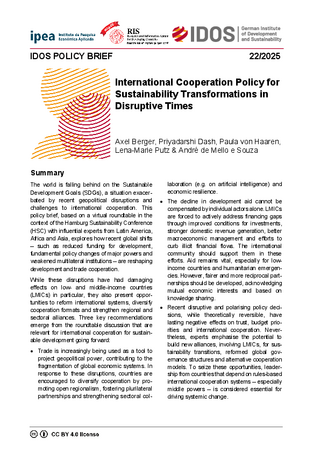International cooperation policy for sustainability transformations in disruptive times
Berger, Axel / Priyadarshi Dash / Paula von Haaren / Lena-Marie Putz / André de Mello e SouzaPolicy Brief (22/2025)
Bonn: German Institute of Development and Sustainability (IDOS)
DOI: https://doi.org/10.23661/ipb22.2025
The world is falling behind on the Sustainable Development Goals (SDGs), a situation exacerbated by recent geopolitical disruptions and challenges to international cooperation. This policy brief, based on a virtual roundtable in the context of the Hamburg Sustainability Conference (HSC) with influential experts from Latin America, Africa and Asia, explores how recent global shifts – such as reduced funding for development, fundamental policy changes of major powers and weakened multilateral institutions – are reshaping development and trade cooperation.
While these disruptions have had damaging effects on low- and middle-income countries (LMICs) in particular, they also present opportunities to reform international systems, diversify cooperation formats and strengthen regional and sectoral alliances. Three key recommendations emerge from the roundtable discussion that are relevant for international cooperation for sustainable development going forward:
• Trade is increasingly being used as a tool to project geopolitical power, contributing to the fragmentation of global economic systems. In response to these disruptions, countries are encouraged to diversify cooperation by promoting open regionalism, fostering plurilateral partnerships and strengthening sectoral collaboration (e.g. on artificial intelligence) and economic resilience.
• The decline in development aid cannot be compensated by individual actors alone. LMICs are forced to actively address financing gaps through improved conditions for investments, stronger domestic revenue generation, better macroeconomic management and efforts to curb illicit financial flows. The international community should support them in these efforts. Aid remains vital, especially for low-income countries and humanitarian emergencies. However, fairer and more reciprocal part-nerships should be developed, acknowledging mutual economic interests and based on knowledge sharing.
• Recent disruptive and polarising policy decisions, while theoretically reversible, have lasting negative effects on trust, budget priorities and international cooperation. Nevertheless, experts emphasise the potential to build new alliances, involving LMICs, for sustainability transitions, reformed global governance structures and alternative cooperation models. To seize these opportunities, leadership from countries that depend on rules-based international cooperation systems – especially middle powers – is considered essential for driving systemic change.
Dr Priyadarshi Dash is Associate Professor at the Research and Information System for Developing Countries (RIS) in Delhi.
Dr André de Mello e Souza is Head of the International Policy Centre for Inclusive Development (IPC-id) at the Institute for Applied Economic Research (Ipea) in Brasília.



